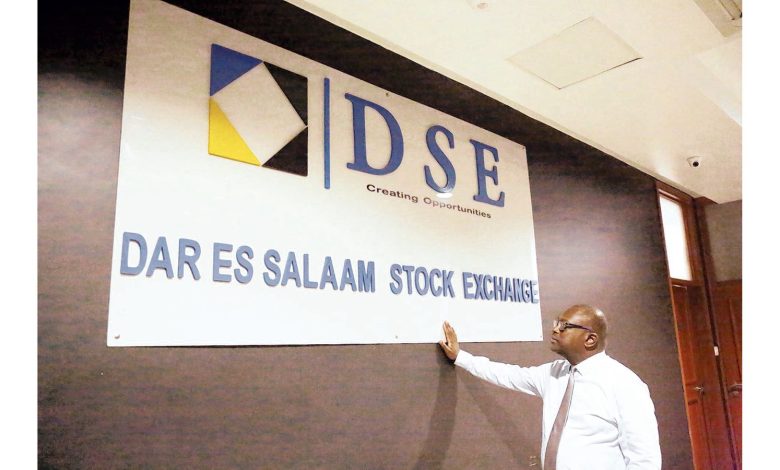DSE activity slows, bonds rally ahead

DAR ES SALAAM: THE Dar es Salaam Stock Exchange (DSE) closed the week with market activity showing a modest decline compared to the previous trading week.
Total turnover for the week declined to 20.6bn/-, representing an impressive 16.98 per cent increase from the prior week’s turnover of 24.8bn/-.
CRDB emerged as the dominant player, contributing 63.47 per cent of the total market turnover, a reflection of heightened investor interest in the counter.
Close behind was TBL, which accounted for 24.41 per cent, NMB and NICO contributed 4.24 per cent and 3.20 per cent of the total turnover, respectively, reinforcing their positions as notable movers in the week’s trading session.
On the price movement front, DSE stood out as the week’s top gainer.
Its share price appreciated by 15 per cent, closing at 3,450/- per share. DCB followed closely, recording a 10.71 per cent increase, closing the week at 155/- per share.
On the loser’s side Precision Air (PAL) recorded the steepest decline for the week, with its share price falling by 14.75 per cent to 260/-.
It was followed by NICO, which shed 2.04 per cent to close at 1,440/- per share.
Market heavyweight TCC also saw a price decline of 1.98 per cent, ending the week at 15,380/- per share, while TBL dropped by 1.96 per cent, closing at 9,500/- per share.
In terms of market valuation, the exchange registered shrinkage in both total and domestic market capitalisation. Total market capitalisation dropped modestly by 0.29 per cent, to 20.73tri/-.
Similarly, domestic market capitalisation dropped by 0.66 per cent, closing the week at 13.44tri/-.
ALSO READ: DSE, TSA to enhance startup capital access
Key benchmark indices
All Share Index (DSEI) closed at 2,418.85 points decreasing by 0.29 per cent.
Tanzania Share Index (TSI) closed at 5,078.91 points decreasing by 0.66 per cent.
Sector Indices
Industrial & Allied Index (IA) closed at 4,908.01 points, down by 1.63 per cent Bank, Finance & Investment Index closed at 8,248.40 points, up by 0.26 per cent.
Commercial Services Index closed at 1,535.82 points, down by 1.21 per cent.
Highlights: Debt Market
Treasury bill auction no: 1181 On July 23rd, 2025, the central bank was in the market offering treasury bills to investors.
The offerings included 900m/- for the 35- day maturity Treasury bill, 1.9bn/- for the 91-day T-bill, 2.9bn/- for the 182-day T-bill and 102.8bn/- for the 364-day T-bill.
In this auction, there was low demand for the 35-day and 182-day Treasury bills, as they did not receive any subscriptions.
The 91- day bill was subscribed this time around and it was oversubscribed by 52.6 per cent.
The 364-day bill was oversubscribed by 380.93 per cent. The Bank of Tanzania accepted 26 per cent of the bids received.
The 364-day bill recorded a decline in its weighted average yield, falling from 8.4152 per cent in the previous auction held in early July to 7.8482 per cent in this auction.
This is equivalent to a drop of 56.7 basis points; this has been a continuous downward trend for the past three auctions.
The price floor was slightly adjusted to 92.7 from 92.19 in the previous auction and the central bank allotted almost exactly what was offered. The inflation rate for June 2025 stood at 3.3 per cent.
Secondary Market Activity
The secondary bond market posted a turnover of TZS 92.86 billion, up from 54.68bn/- in the previous week—an increase of 69.8 per cent.
Activity was primarily concentrated in the longterm bonds; 20-year and 25- year bonds.
Market Outlook
Looking ahead, the market is bracing for the Q2 earnings season, with a series of corporate financial disclosures expected in the next two weeks.
Key companies such as CRDB, NMB and Vodacom are projected to post solid year-on-year earnings growth, driven by rising revenues and improved cost efficiency.
Positive earnings surprises could fuel further price momentum and boost the domestic index.
On the macroeconomic front, the BoT’s recent decision to lower the benchmark rate from 6.00 to 5.75 per cent is expected to improve credit uptake and stimulate economic activity.
This move may also contribute to a gradual shift of investor preference toward risk assets such as equities and mutual funds. However, risks remain.
External shocks, including global commodity price fluctuations and regional geopolitical uncertainties, could dampen investor confidence.
Portfolio diversification, active fund management and vigilant macro-monitoring remain key themes for investors navigating the remainder of quarter three. Looking ahead, we expect:
• Continued bullish sentiment on selected banking and industrial counters.
• Slightly reduced institutional interest in longterm government bonds, attributed by lower rates.
• A cautious but optimistic equity market recovery, contingent on corporate earnings performance and macroeconomic data including June inflation figures.





